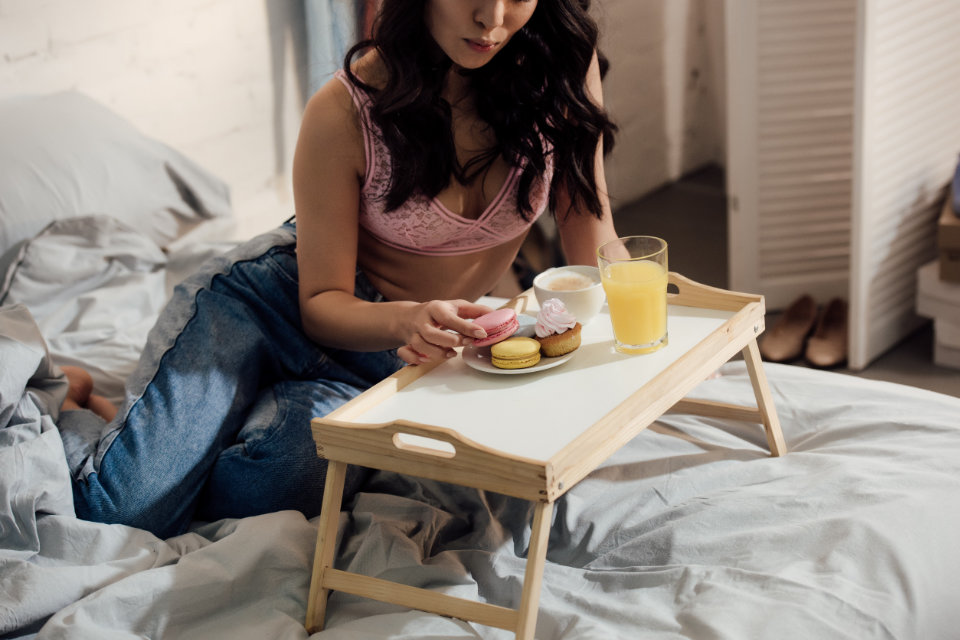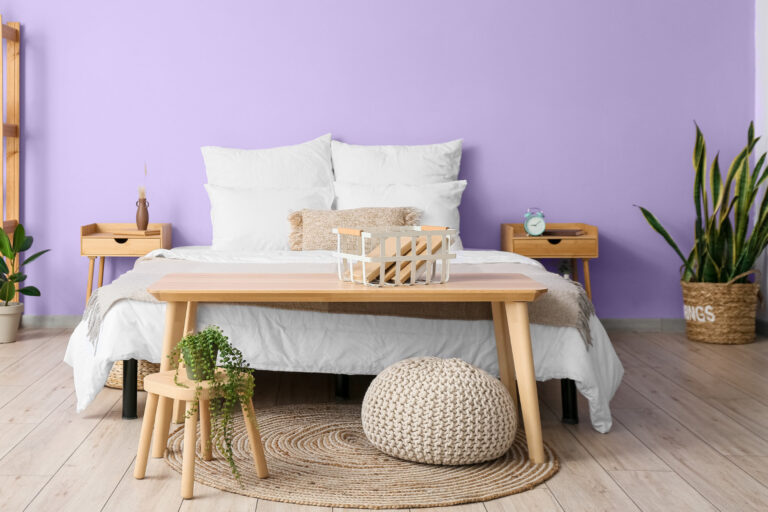Feng Shui, the time-honored Chinese art of harmonizing our surroundings, is deeply intertwined with every facet of life, right down to the direction we face when we sleep.
This practice, rich in symbolism and tradition, is rooted in the belief that our environment profoundly influences our vitality, well-being, and overall quality of life, with our Feng Shui sleeping directions playing a pivotal role.
A good night’s sleep does more than just recharge our bodies; it can transform our days, filling them with renewed energy and zest for life. Imagine waking up feeling refreshed and rejuvenated every day, with the help of the powerful principles of Feng Shui guiding your sleeping patterns.
Could there be a more enticing path towards embracing balance, harmony, and a profound sense of tranquility in our ever-busy lives?
In this comprehensive article, we delve into the fascinating world of Feng Shui sleeping directions and bedroom Feng Shui, exploring their significance, learning how to determine the best sleeping direction for you, and understanding how this ancient wisdom can enhance not only your sleep but your overall life experience.
So, let’s embark on this enlightening journey and uncover the potent energy that lies in the alignment of our sleeping directions with the magnetic forces of the earth.
Table of Contents
Understanding Feng Shui Energy (Chi)
In Feng Shui, life energy is referred to as Chi. It flows through everything around us and carries both positive (Yang) and negative (Yin) aspects.
A balanced Chi is crucial for a peaceful sleep and a productive waking life. An obstructed or imbalanced Chi flow can cause restlessness and insomnia, affecting our overall health and wellness.
The Concept of the Eight Mansions (Ba Zhai)
One of the core concepts in Feng Shui is the Eight Mansions or Ba Zhai. This system divides people into two groups: East and West. Each group has four favorable and four unfavorable directions.
This categorization is determined by calculating the Kua number, a crucial element of personal Feng Shui.
| Group | Kua Numbers | Success (Sheng Chi/生气) | Health (Tien Yi/天医) | Love (Nien Yen/年炎) | Personal Growth (Fu Wei/伏位) |
|---|---|---|---|---|---|
| East | 1, 3, 4, 9 | Southeast (东南) | East (东) | South (南) | North (北) |
| West | 2, 5, 6, 7, 8 | Northwest (西北) | West (西) | Northeast (东北) | Southwest (西南) |
Determining Your Best Sleeping Direction
To find out your best sleeping direction, you need to calculate your Kua number using your birth year and gender.
Once you know your Kua number, you can identify your best sleeping directions using the East/West group information.
| Kua Number | Wealth & Money (Sheng Chi/生气) | Health (Tien Yi/天医) | Love/ Marriage (Nien Yen/年炎) | Wisdom & Education (Fu Wei/伏位) | Least Worst Direction (Ho Hai/咸池) |
|---|---|---|---|---|---|
| 1 | Southeast | East | South | North | West |
| 2 | Northeast | West | Northwest | Southwest | East |
| 3 | South | North | Southeast | East | Southwest |
| 4 | North | South | East | Southeast | Northwest |
| 5 (Female) | Southwest | Northwest | West | Northeast | East |
| 5 (Male) | Northeast | West | Northwest | Southwest | South |
| 6 | West | Northeast | Southwest | Northwest | Southeast |
| 7 | Northwest | Southwest | Northeast | West | North |
| 8 | Southwest | Northwest | West | Northeast | South |
| 9 | East | Southeast | North | South | Northeast |
Feng Shui Tips for Your Bedroom
In addition to knowing the best sleeping direction, other Feng Shui principles can be applied to your bedroom for a good sleep:
- Position your bed in the “command position,” i.e., against a solid wall and with a clear view of the door but not in line with it.
- Maintain a balanced room with no heavy items on one side.
- Avoid mirrors facing the bed.
- Choose calm and soothing colors for your bedroom.
The Impact of Bed Type and Color in Feng Shui
The bed, being the centerpiece of the bedroom, plays a significant role in bedroom Feng Shui. According to Feng Shui principles, the material of your bed can influence the energy flow.
Wooden beds are considered ideal as they are natural and help in grounding energy. Metal beds, on the other hand, should be avoided, as metal conducts electricity and can disrupt the energy flow.
The color of your bed and bedding also matters. Earth tones, skin colors, and pastels are considered best for creating a peaceful and relaxing atmosphere.
Red, while being a powerful Feng Shui color, can be too stimulating for the bedroom and might disrupt sleep.
Good Feng Shui Items for Your Bedroom
Enhancing your bedroom’s Feng Shui can be achieved by incorporating certain items. Placement is also key:
- Crystals: Crystals, like rose quartz, are often used to improve relationship harmony. Place it in the southwest corner of your bedroom.
- Wooden Furniture: As mentioned, wooden items promote grounding energy. A wooden bed frame or nightstand can enhance this.
- Plants: Greenery promotes vibrant, living energy.
Suitable Feng Shui Plants for Bedroom
- Snake Plant (Sansevieria trifasciata): Also known as the “Mother-in-Law’s Tongue,” this plant is renowned for its air-purifying properties and is believed to promote protective energy.
- Spider Plant (Chlorophytum comosum): An excellent air purifier, the Spider plant is said to bring love and happiness to the room it inhabits.
- Peace Lily (Spathiphyllum): Symbolizing tranquility and harmony, the Peace Lily is believed to provide calming energy, making it a great choice for a bedroom plant.
- Areca Palm (Dypsis lutescens): Known for its ability to remove toxins from the air, the Areca Palm can help create a peaceful and relaxed environment.
- Lucky Bamboo (Dracaena sanderiana): Although it needs to be kept out of direct sunlight, Lucky Bamboo is said to attract health, love, and luck.
While these Feng Shui plants are beneficial from a Feng Shui perspective, it’s essential to care for them properly and ensure they are suitable for your specific situation and environment.
Remember that a neglected or dying plant can have the opposite effect and create negative energy. Always consider your personal preferences and health concerns, especially if you have allergies or sensitivity to certain types of plants.
The Effect of Co-Sleeping in Feng Shui
In Feng Shui, the number of people sleeping in the bed can impact the energy flow. It’s recommended that adults have their own space to ensure a restful sleep. If children or pets share the bed, it can create disruptions.
Feng Shui and Dream Meanings
Feng Shui also extends to the realm of dreams, providing insight into our subconscious.
For example, dreaming of flowers could indicate personal growth and beauty in your life. Dreaming of a tiger, a powerful Feng Shui symbol, may symbolize strength and courage, or conversely, a powerful threat. Dreaming about running might signify the need to face issues directly rather than avoiding them.
Common Misconceptions About Feng Shui Sleeping Directions
Despite its ancient roots, there are misconceptions about Feng Shui. It’s not a magic solution to life’s problems, and it’s not about superstition. Instead, it’s about creating a positive environment by optimizing energy flow.
The Implications of Ignoring Feng Shui Sleeping Directions
If Feng Shui sleeping principles are ignored, you may experience poor sleep, stress, and health problems. While not all negative life experiences are a result of bad Feng Shui, considering these principles can certainly help improve your overall wellbeing.

Things to Avoid in Your Bedroom According to Feng Shui Principles
Here are some “Don’ts” that should be avoided according to Feng Shui principles:
- Don’t Sleep with Your Feet Facing the Door: Known as the ‘Death Position’ because the deceased are carried out feet first, this position is considered bad luck.
- Don’t Place Your Bed Under a Window: This is believed to disrupt your energy by allowing it to flow out the window and cause restless sleep.
- Don’t Sleep Under a Beam: Beams can create a feeling of pressure that can disrupt your sleep and overall well-being.
- Don’t Place Your Bed Against the Same Wall as the Door: The door should be easily visible from the bed, but not in a direct line with it.
- Don’t Keep Electronic Devices Near Your Bed: The energy of the electronics can disturb your sleep and cause health problems over time.
- Don’t Hang Mirrors Facing Your Bed: Mirrors are thought to bounce energy around the bedroom, which may increase stress and restlessness.
- Don’t Keep Clutter Under Your Bed: The energy needs to circulate around your body when you sleep, and clutter under the bed can disrupt this flow.
- Don’t Bring Work Into Your Bedroom: The bedroom should be a sanctuary for rest and relaxation, not work and stress. Keep work-related materials out of the bedroom to promote better sleep and relaxation.
- Don’t Hang Lights Directly Over Your Bed: Hanging lights over your bed can be a source of “Sha” or killing energy, making it harder for you to rest and relax. If you want to have a light source above your bed, consider softer, ambient lighting rather than harsh, direct lights.
- Don’t Install a Ceiling Fan Directly Above Your Bed: Just like hanging lights, a ceiling fan right over your bed can also create disruptive energy, disturbing your sleep. If you need a fan in your bedroom, try to place it in a spot where it’s not directly aligned with your bed.
- Don’t Sleep Directly on the Floor: Sleeping on the floor without a proper bed or mattress is considered bad Feng Shui. It’s believed to prevent your personal energy (Chi) from flowing correctly. It is also thought to make you more susceptible to the earth’s energies, which can be too yin (passive), resulting in illnesses and draining your vitality.
- Don’t Place a TV in Your Bedroom: Feng Shui advises against having a TV in your bedroom. The electromagnetic waves emitted by televisions can disturb the tranquility of the room, affecting your sleep. If it’s necessary to have a TV in your room, cover it when not in use to minimize its impact.
- Don’t Install an Air-conditioner Directly Above Your Bed: Similar to the principle of not having a ceiling fan above your bed, an air-conditioner should not be positioned directly over your sleeping area. The constant flow of cold air can disrupt the balance of energies while you’re resting.
- Don’t Choose a Mattress That’s Too Hard or Too Soft: The type of mattress you use plays a crucial role in the quality of your sleep. A mattress that’s too hard can lead to body aches and disrupt your sleep, while one that’s too soft may not provide adequate support, leading to back problems. Choose a mattress that provides optimal comfort and support according to your needs.
- Don’t Eat in Your Bedroom: According to Feng Shui principles, it’s inadvisable to eat in your bedroom. Eating in your bedroom can disrupt the energy balance and cleanliness. Crumbs and food residues can attract insects, while the smell of food can linger, affecting the freshness of the room. Additionally, eating in bed can lead to poor digestion as your body associates the bedroom with relaxation and sleep, not digestion. Keeping your eating and sleeping spaces separate encourages healthier habits and better sleep quality.
Benefits of Applying Feng Shui Sleeping Directions
Proper Feng Shui sleeping direction can lead to enhanced sleep quality, improved health, and a better mood. It can also boost productivity and pave the way to personal and professional success.
Unleash the Power of Feng Shui for Your Sleep
Embracing the wisdom of Feng Shui sleeping directions can bring a significant positive impact on your sleep and overall life. Remember, the ultimate goal is to achieve balance and harmony.
So, are you ready to bring about a positive change in your life with the power of Feng Shui? Try applying the Feng Shui sleeping directions to see the improvement for yourself.
What if I can’t adjust my bed to my Feng Shui sleeping direction?
If you cannot change your bed position, try adjusting your room layout, minimizing clutter, or using Feng Shui cures like crystals and wind chimes to improve the Chi flow.
Can I apply Feng Shui principles to other parts of my home?
Yes, Feng Shui can be applied to all areas of your home, including your living room, kitchen, and even bathroom, to create a harmonious living environment.
Can Feng Shui sleeping directions change over time?
While the Kua number and associated directions stay the same throughout your life, the annual and monthly Feng Shui stars do shift and can temporarily influence your luck.
Does Feng Shui really work?
While empirical scientific evidence is limited, many people report positive changes in their lives after applying Feng Shui principles. As with any holistic practice, personal experiences can vary.
Is it bad to sleep with your feet facing the door in Feng Shui sleeping directions?
Yes, this is called the “coffin position” in Feng Shui and is considered to carry negative energy. It’s best to position your bed so that your feet do not point directly towards the door.
How to prevent nightmares in Feng Shui?
In Feng Shui, nightmares can be prevented by optimizing the bedroom environment for positive energy flow. This includes positioning your bed correctly, using calming colors, and reducing clutter. Placing calming Feng Shui symbols such as dream catchers or crystals like amethyst by the bed can also help ward off bad dreams.



